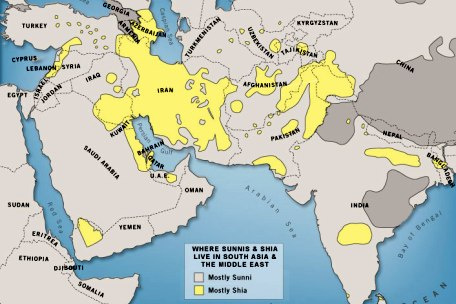Do You Really Want to Pull at That Thread

If you are a Tehran-based media correspondent, or a tourist having had the courage to defy anti-Iran stereotypes and visit our country; kindly take a walk in downtown Tehran, engage in a small talk with pious Iranians and give them a snippet of a general knowledge quiz: what Islamic denomination does the Assad family follow? Fearless of the skyrocketing USD exchange rate in Tehran, I’ll bet one hundred bucks that they identify the family as Sunnis. Should they be more informed, and know of Assads’ Alawite background, ask them if Alawites are Shi’as; two hundred bucks says that their answer is a no, and at that moment you may also observe a look of surprise on their face; despite the fact that Damascus is one of the most popular pilgrimage destination for the religious Iranians (as it hosts the tomb of Zeinab, daughter of the first Shi’a imam, Ali, and an iconic figure in the Shi’a history).
I’m not surprised if the Western media label the Syrian government as Shi’a. Their lack of knowledge on the Middle East fabric is sort of a given (even the Bush administration seemed to have no idea of Islamic sects until it saw Iraq slide into a sectarian war.) But why has the BBC Persian, or the Turkish Today’s Zaman, taken a liking in equating Alawites and Shi’as? They could not be pardoned with this mistake. Or is it really a mistake? Noticing how this polarized framing could pay dividends for some regional actors, one has every reason to hesitate when calling it a mistake. After all, this narrative easily puts the struggle between the regional powers to take helm of the Arab Spring in their hands, and their fierce battle over Syria, into the age-old context of the Sunni-Shi’a schism. It gives substance to ferocious anti-Assad policies of Ankara, Riyadh and the biting off-more-than-it-can-chew Doha. Things turn painfully funny when even the Israeli Ha’aretz tries to aggrandize the rift, reporting of Hamas crackdown on Shi’a community in Gaza.
But does one really want to pull at that thread? After all, the consequences of this divisive policy may happen to be less than beneficial for its propagators, at its best turning their Middle East conquest into a pyrrhic victory. A quick glance at demographics of the region won’t do us any harm: Iran, holds a substantial 89% of Shi’as, this figures amounts to (minimums estimations cited) 65% for the Republic of Azerbaijan (deeply secularized under the Soviet rule –and later the Aliyevs, but showing a burgeoning interest in its ancestors’ faith), 65% in Iraq (as a de facto rule, the prime minister, the most powerful authority in the country, is always Shi’a), 30% in Lebanon (largely represented by Amal and Hezbollah), 60% in Bahrain (whose uprising against institutionalized discrimination suffers media blackout, simply because they have committed the unforgivable sin of following the wrong denomination) and 30% in Kuwait.
To make it a clearer picture, let’s remind ourselves that these numbers only represent the mainstream branch of Shi’as, namely the Twelvers, which is a narrow definition of who is qualified to be known as a Shi’a. Bringing into the circle other lesser known Shi’a factions dictates a second thought before portraying this turbulent situation of the Middle East as a Shi’a-Sunni rift: more than one-third of Yemen’s population are Zaydi; including the Yemeni tyrant Ali Abdullah Saleh (though he hardly fits as a loyal Zaydi, for with the help of his Saudi patrons, the man ruthlessly massacred the Zaydi Houthis in northwestern Yemen.) And then consider Alawites who form an un-ignorable 15-million strong population in Turkey itself –and they are already complaining about the denial of their rights, along with 3 million of their Twelver brethren. So think of how Iran could turn the propaganda right back at those beating on the drums of sectarian war in the region before talking of a Shi’a-ruled Syria.
One is left with nothing but sad reminders of those happy days when the Turkish PM Recep Tayyip Erdogan attended the Ashoura rituals of the Shi’a community in Istanbul, calling the Karbala event a source of Shi’a-Sunni unity, as the former Iranian Foreign Minister Ali-Akbar Velayati stood by his side. Those pictures are washed away now, sadly to be replaced by Turkey’s assertive support for Tariq al-Hashimi, the Sunni Vice President of Iraq, who is charged of terrorism including plotting to assassinate PM Nuri al-Maliki, or to see Erdogan threaten Bashar al-Assad and show the green light for an Al Qaeda sympathizer, Abdul Karim Belhaj, to set camp in the Turkish soil and prepare for a war to overthrow Bashar. The prospect becomes ever more gloomy knowing that even the Turkish FM Ahmet Davutoglu -who has theorized the AKP’s neo-Ottoman agenda- seems to have forgotten how the Sunni Ottomans and the Shi’a Safavids fought decades of futile wars (I, II, III), only to the benefit of the Europe.

